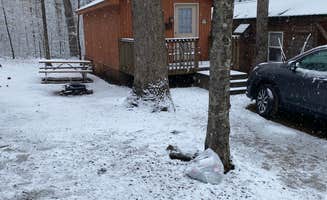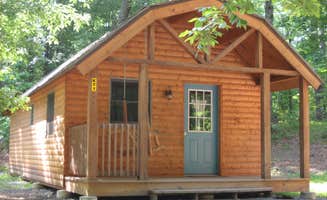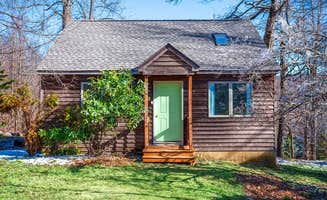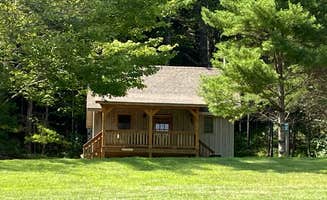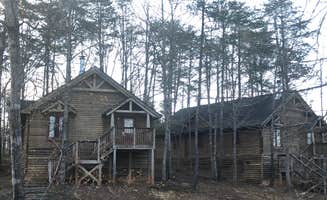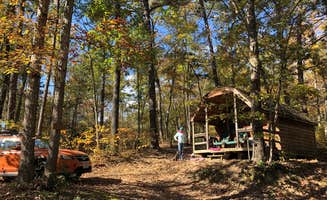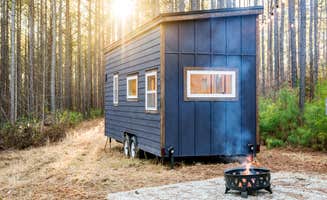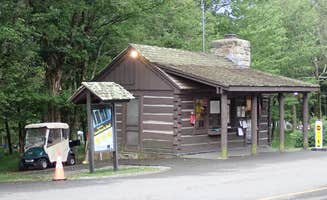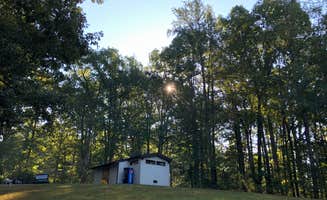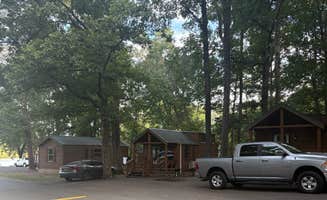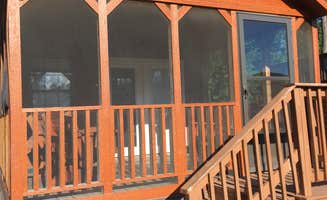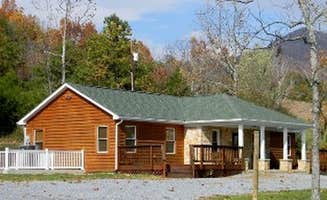Cabin camping near Crozet, Virginia offers access to the Blue Ridge Mountain foothills at elevations between 700-1,200 feet. Winter overnight temperatures regularly drop below freezing from November through March, while summer highs average in the mid-80s with significant humidity. Most cabin sites in this region are situated within a 25-mile radius of Crozet, providing varying levels of seclusion depending on the campground's layout and terrain.
What to do
Waterfall hiking: 1 mile from cabins at Crabtree Falls Campground where the trail provides access to one of Virginia's most scenic waterfalls. "Crabtree Falls is a mile up the road and very easy to get to the trail head. The AT is also close by and easily accessed," notes a visitor. Camp hosts report many hikers use cabin accommodations as a base for exploring multiple sections of the Appalachian Trail.
Wildlife viewing: Early morning or dusk offers the best opportunities at Big Meadows Campground which is known for abundant wildlife. One camper observed, "We saw many deer and bear while camping. Just being in Shenandoah is a soothing experience. With so many hiking trails and waterfalls nearby we love to camp in Big Meadows - and for the star watching at night." Cabin guests should bring binoculars for optimal viewing.
Fishing: No license required in private ponds at several cabin-friendly locations. Shenandoah Valley Campground offers a stocked fishing area. "Great access, 30, 50, primitive, pull in, back in, cabin, pretty much full gamut. Quickly becoming a favorite," reports one visitor about the fishing opportunities at Misty Mountain Camp Resort.
What campers like
Cabin privacy: Wooded sites at Lewis Mountain Campground provide natural separation between units. "Lewis mountain has all the amenities of home within walking distance if you just can't live without them; bathrooms, showers, kitchen sink, fire pit, small store and 2 personal vehicle parking spots steps away from the tent," explained one visitor. Cabins here are typically booked 2-3 months in advance during peak season.
Creek access: Direct water views make certain cabin sites especially desirable. A camper at Crabtree Falls Campground shared, "The sites were right on the river, we had a walk to which gave us some extra privacy. Beautiful area for hiking, lots leading off of the AT. Campground hosts are very friendly." Most creek-side cabins cost $10-15 more per night than standard units.
Family activities: Scheduled events occur regularly at family-oriented campgrounds. "This camp ground was nice and cozy. The tent sites we stayed in were 10 ft away from the Tye river, we literally fell asleep to the sound of the water every night," noted a visitor to Crabtree Falls. Morning ranger programs at Shenandoah National Park campgrounds often focus on wildlife education and Junior Ranger activities.
What you should know
Seasonal operation: Most close October-April except for a few year-round options. At Loft Mountain Campground, a visitor noted, "There is also a very nice and well stocked campstore. They had everything you need." Park concessions typically close by mid-October regardless of weather conditions.
Shower facilities: Pay showers are common at national park locations. "The shower was about 0.3 miles away. They charge $5 for 10 min, which you have to pay in quarters," reported a Loft Mountain camper. Private campgrounds generally include shower access in their cabin rental fees.
Cell coverage: Limited or nonexistent throughout much of the region. A visitor to Shenandoah Valley Campground warned, "No wifi, no cable and cell service is limited - definitely not good for Verizon." Many cabins provide information binders with local maps since digital navigation often fails in the mountains.
Tips for camping with families
Bunk beds: Request specific cabin layouts when traveling with children. At Shenandoah Valley Campground, families appreciate the variety of sleeping arrangements. "Great campground with lots to do with the family. My kids loved all the bunnies, the river, pool and putt-putt," shared one visitor, highlighting the amenities beyond just the sleeping quarters.
Playground access: Check proximity to avoid long walks with tired children. "Very laid back atmosphere, plenty for the kids to do! Kept them occupied the whole trip! Enjoyed the music and smores offered by the campground," noted a visitor to Misty Mountain Camp Resort about the organized activities.
Wildlife safety: Store food properly to prevent unwanted animal encounters. "Big Meadows Campground was wonderful. Facilities were clean and well maintained. Bear box for food storage. Loved seeing the deer so close and other wildlife," explained a camper, emphasizing the importance of using provided bear boxes.
Tips from RVers
Cabin vs. RV parking: Some sites combine both for families traveling together. At Walnut Hills Campground, visitors find flexibility in accommodation types. "Located within minutes of I81. We stopped for 2 nights to see the Shenandoah National Park on our way to NC. Called last minute and got a site. Very nice customer service," reported an RVer about the ease of booking.
Winter heating: Check cabin insulation ratings before booking November-March stays. "Bathhouse was very clean and very well thought out. Electric sites have 20a, 30a, and 50a hookups so small trailers can use a normal extension cord," noted a visitor to Misty Mountain Camp Resort, which matters for electric heater capacity in cabins.
Kitchen amenities: Inventory varies widely between basic and deluxe cabins. Travelers should confirm whether utensils, cookware, and refrigeration are included. Cabins at private campgrounds typically offer more kitchen equipment than those in national park settings.


